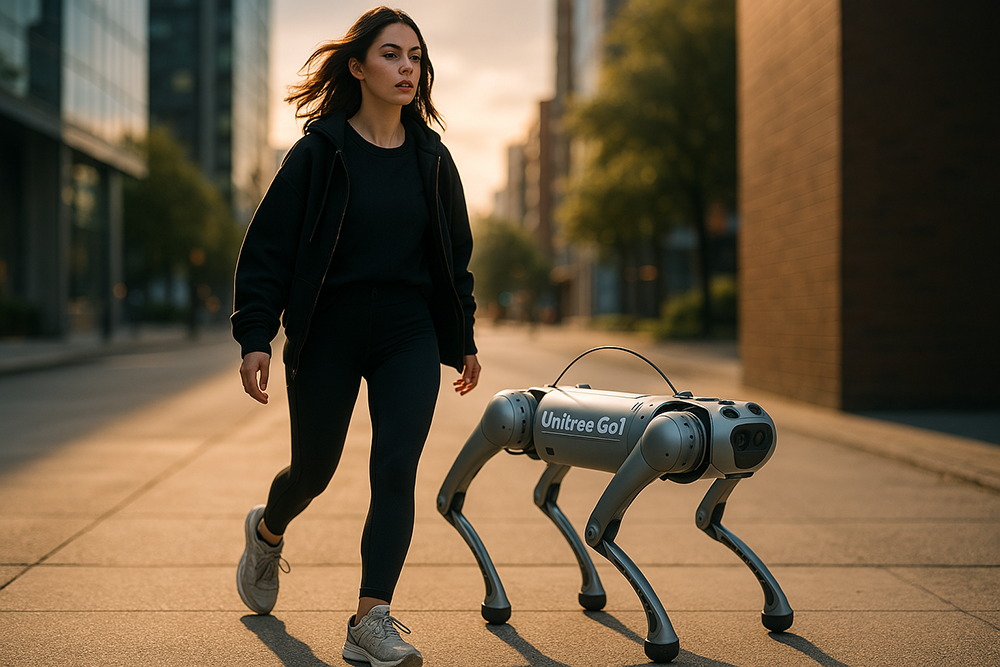As reported by the CyberInsider platform on March 24, 2025, security experts have discovered a pre-installed, undocumented remote access tunnel in the Unitree Go1 robot dogs that enables remote control and network access. The Unitree Go1 can be found in numerous companies and universities. During their tests, the researchers were able to list all connected devices and their IP addresses and access these devices. They were also able to use the robotic quadruped’s cameras for live monitoring. The article states: “Perhaps most concerning is the implication of deliberate design. The tunnel is not merely an over-looked debug utility; it appears fully integrated into the boot process and enabled by default.” (CyberInsider, 24 March 2025) Users should immediately isolate their devices from critical internal networks, change SSH credentials, and disable the tunnel service. More information is available on the platform.
The Next Social Robots Module
The elective module “Soziale Roboter” (“Social Robots”) by Prof. Dr. Oliver Bendel will be held again from April 15 to 17, 2025 at the FHNW in Olten. It is primarily aimed at prospective information systems specialists, but prospective business economists can also take part. Dr. Amol Deshmukh has been invited as a guest speaker. He previously worked for the University of Glasgow and now conducts research at ETH Zurich. In his lecture, he will present the findings from his paper “Leveraging Social Robots to Promote Hand Hygiene: A Cross-Cultural and Socio-Economic Study of Children in Diverse School Settings”. Unitree Go2, Alpha Mini, Cozmo, Vector, Aibi, Furby and Booboo from Oliver Bendel’s private Social Robots Lab will also be on site. Social Robotics Girl, a so-called GPT who specializes in this topic, will be available as a tutor throughout the event. Basic works are “Soziale Roboter” (2021) and “300 Keywords Soziale Robotik” (2021). At the end of the elective module, students design social robots – also with the help of generative AI – that they find useful, meaningful, or simply attractive. The elective modules have been offered since 2021 and are very popular.
Start of the VISUAL Project
The kick-off meeting for the VISUAL project took place on March 20, 2025. It was initiated by Prof. Dr. Oliver Bendel from the FHNW School of Business. “VISUAL” stands for “Virtual Inclusive Safaris for Unique Adventures and Learning”. There are webcams all over the world that show wild animals. Sighted people can use them to go on a photo safari from the comfort of their sofa. Blind and visually impaired people are at a disadvantage. As part of Inclusive AI – an approach and a movement that also includes apps such as Be My Eyes with the Be My AI function – a solution is to be found for them. The aim of the project is to develop a prototype by August 2025 that enables blind and visually impaired people to have webcam images or videos of wild animals described to them. The system analyzes and evaluates them with the help of a multimodal LLM. It presents the results in spoken language via an integrated text-to-speech engine. As a by-product, poaching, bush and forest fires and other events can be detected. The project is likely to be one of the first to combine inclusive AI with new approaches to animal-computer interaction (ACI). Doris Jovic, who is completing her degree in BIT, has been recruited to work on the project.
Apollo Comes to Berlin-Marienfelde
According to a press release from March 18, 2025, Mercedes-Benz is bringing one of “the most advanced commercial humanoid robots in the world” (Mercedes-Benz press release, own translation) to Berlin-Marienfelde. This site has established itself as a global competence center for production digitization since the launch of the Mercedes-Benz Digital Factory Campus (MBDFC) in 2022. The manufacturer, Apptronik, is based in Austin and was founded in 2016 as a spin-off from the Human Centered Robotics Lab at the University of Texas. According to its website, Apollo is “the first commercial humanoid robot that was designed for friendly interaction, mass manufacturability, high payloads and safety” (Apptronik website). The robot stands approximately 172 cm tall and weighs about 72 kg. Unlike comparable bipedal robots, it does not have a display in the facial area, but only two eyes. Its head resembles that of social robots such as ARI or P-Care. Apollo is a modular system that can be used either in a stationary or mobile setup. Regarding its implementation, Mercedes-Benz states in the press release: “The Apollo robots have collected data in a production environment in order to train for specific use cases” (Mercedes-Benz press release, own translation). Employees with hands-on production experience at Mercedes-Benz “transferred their knowledge to Apollo using teleoperation processes and augmented reality” (Mercedes-Benz press release, own translation). “Now, Mercedes-Benz is taking the next crucial development step at the MBDFC in Berlin: The Apollo robots are learning to operate autonomously – a technological milestone on the path to a flexible, intelligent assistance system for production” (Mercedes-Benz press release, own translation).
Sponsorship for the ICSR 2025
Join us as a sponsor for the 17th International Conference on Social Robotics & AI, taking place on 10-12 September 2025 at Naples, Italy. This prestigious event brings together researchers, leading experts, innovators, and thought leaders in the fields of robotics, AI, and human-robot interaction. Don’t miss the opportunity to align your brand with cutting-edge advancements. We offer different sponsorship/exhibition packages, all information is available at the page: icsr2025.eu/sponsor2/. If you are interested or have any questions, don’t hesitate to contact us at info@icsr2025.eu with the subject line tag [Sponsorship]. The ICSR is one of the leading conferences for social robotics worldwide. Participants will meet for two days at the Parthenope University of Naples and for the third day at the Città della Scienza conference center. More information on icsr2025.eu.
The Robodog Project Starts
Robotic four-legged friends – often referred to as robot dogs – are becoming more and more widespread. As a result, they will also encounter more and more real dogs. The question is how to design, control, and program the robot in such a way that the animals do not overreact and cause no harm to robots, animals, or bystanders. As part of “The Robodog Project”, smaller dogs are to be confronted with a walking, running, and jumping Unitree Go2. The plan is to visit controllable environments such as dog training grounds and arrange meetings with dog owners. The findings will lead to suggestions for design and control. Robot enhancement can also play a role here. For example, hobbyists have produced heads for Unitree Go2 using a 3D printer, giving the robot a completely different look. Suggestions for programming will also be made. The project is due to start at the FHNW School of Business in March 2024. It is part of Prof. Dr. Oliver Bendel’s research in the field of animal-machine interaction.





